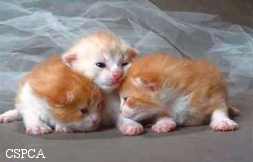 |
|
|
Back To Top |
|
Pet CareCaring for Cats:
Cats respond well to kindness and will become affectionate members of the household. Most people prefer to start with a kitten but adult cats are often better for the elderly or where there are very young children. Kittens are best bought at about two months old when they are fully weaned and have a full set of white teeth. An ordinary cat will make just as good a pet as a purebreed, provided it is healthy. Within a litter kittens differ in temperament: choose one which is lively, playful, not over-nervous and in good health. Carry cats and kittens home in a warm basket or cardboard pet box. AccommodationThe whole house is home for your cat. Apart from this, the bed for a kitten is a simple plastic box or basket. Provide a soft cushion with a washable cover, or alternatively, provide crumpled newspaper to be renewed daily. Put the bed where there are no draughts and where the cat will have privacy away from people and other household pets. House TrainingA dirt-tray is really an indoor substitute for a garden and mother cats normally train their young to dig and conceal their droppings; provide a shallow metal or platic tray containing clean sand, soft peat litter or kitty litter. Empty it out daily, re-using a little of the old litter to retain familiarity. Scrub the tray with household detergent (never antiseptic such as carbolic) evry second day. Go through the scratching motions with the kittens paws to train it; never punish a kitten for misbehaving elesewhere. Have a scratching post for your kitten/cat as this will save your household furniture and keep the claws in trim. DietCats are laregly carnivorous but not entirely so. A well balanced mixed diet is best, of which at least a third should be protein. Dried and tinned foods are convenient but must be varied with fresh food. Monotony should be avoided. Cats can acquire individual preferences for milk, fish, meats and tinned cat food. It is wise to alternate diets. Meals should be given at regular times, to be cleared away after 15 minutes. Fresh water should always be available and replaced twice daily. Kittens require frequent meals. At 8 weeks a kitten should get 4 meals daily, at 16 weeks it should get 3 meals daily and at 24 weeks it should get 2 meals daily. Grooming and CleaningAll cats wash and groom themselves, but domestic cats need further attention. Grooming routines should be introduced early and gradually, to ensure their acceptance. First remove any burrs and very gently comb out any dense tangles with a coarse comb. Follow with a fine comb to reach the underfur and finish off with a soft brush, working from head to tail. Cats prefer firm brushing to too light a touch. Cats should never need washing but for really dirty fur rub with a damp cloth from head to tail, drying off with a second cloth. Butter is helpful in removing road tar from the paws. Shampoos should not be used unless so advised by a vet. Exercise and PlayCats are born hunters and require daily exercise, both indoors and outdoors if the weather is good. Cats should never be turned out at night and good training will do much to ensure that they stay at home. Cats of all ages enjoy playing and will invent chasing and hunting games, with anything thats available. Young kittens need plenty of rest and should not be over-stimulated by too much play. BreedingCats should be neutered unless wanted for breeding. Pregnancy lasts about nine weeks. Expectant mothers should be treated with care, and never picked up by children. Extra vitamins, milk and food, especially proteins will be needed. Seek advice from a vet. The bed should be lined wih clean old towels and placed in a quiet dark corner, where the cat will not be disturbed. After the kittens are born, still further amounts of food should be given to the mother and she should not be disturbed. HealthIf properly cared for cats are hardy animals and rarely suffer from illness. In all cases of suspected ailment the cat should be brought to a veterinary surgeon. Vaccination at 7/8 weeks old is recommended, with booster doses later. You should remeber that many cat ailments cause great suffering unless immediate veterinary aid is sought.  To Pet Care Section To Pet Care Section |
|
|
|